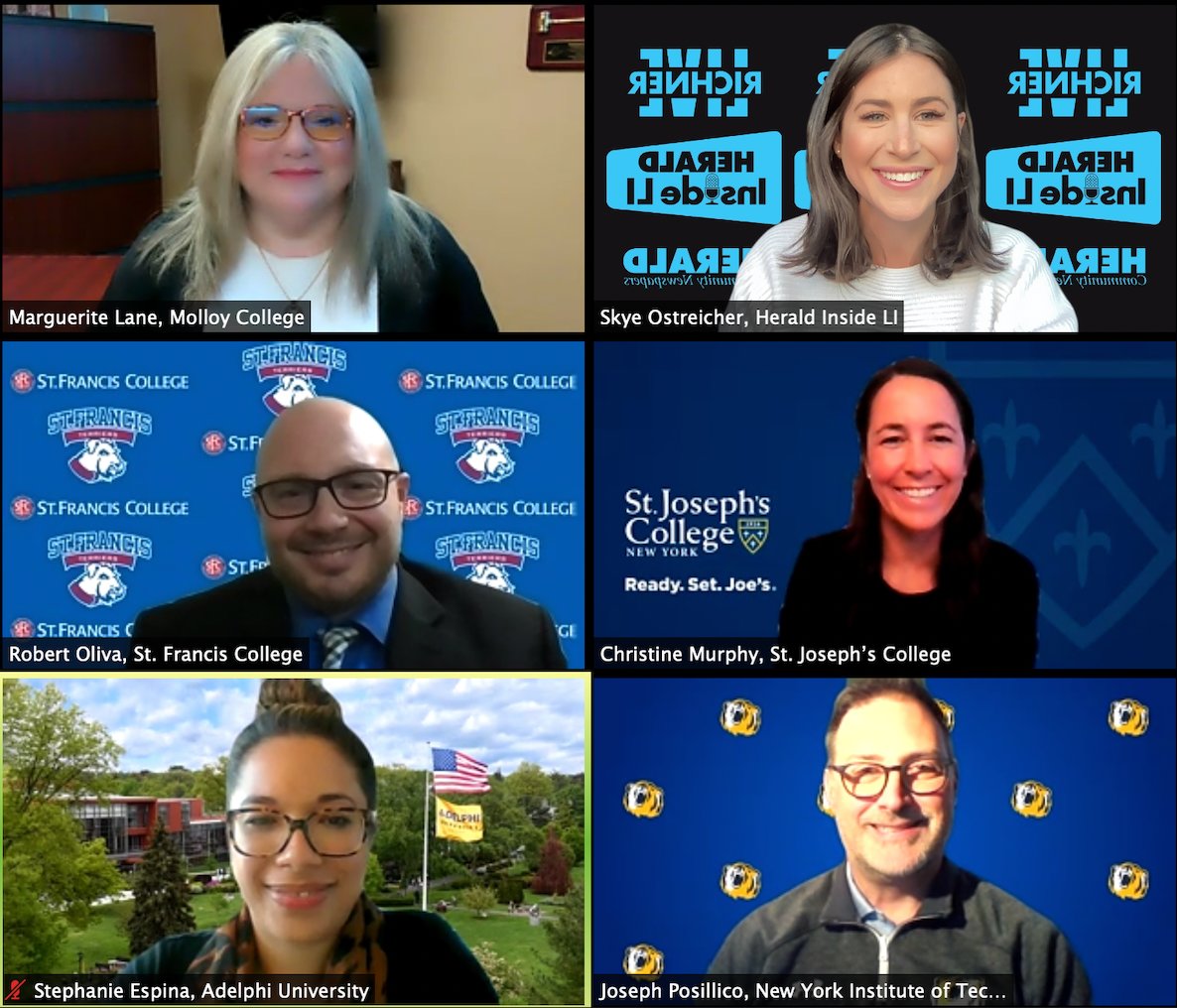Herald Inside LI hosts College webinar on upcoming fall semester
Posted
As a result of the pandemic, colleges everywhere have had no choice but to make social and academic changes to their school settings. Students, faculty and staff have adapted to our new normal.
Many Long Islanders who are considering college in the near future have unanswered questions about what their college experience during a pandemic would be like and what they can expect to gain from their post-pandemic college experiences.
To shed light on the many questions local prospective college students have, Herald Inside LI held a live webinar called, “Staying Local for College,” on April 8 at 7 p.m.
Panelists from local colleges and universities discussed accommodating students during a pandemic and campus protocols for the Covid-19 vaccines. Many of the panelists also reflected on what it was like when the pandemic first hit, versus how time has led to evolving to a new way of running the educational environments.
“When the pandemic first happened, it was harder to have the same type of interactions without in-person meetings and I think eventually students and staff got sick of virtual meetings,” said Marguerite Lane, the assistant vice president of enrollment management at Molloy College. “However, now I can happily say that we are having more personal contact and the majority of our courses will be in-person in the fall, but we will have hybrid and virtual options for those who are more comfortable with that.”
Lane, who has been working at Molloy College for 33 years, said that the school has adapted to the pandemic by bringing about many new changes to help students. Molloy College recently completed renovations on new residence halls. Despite having mostly commuter students, the school will have some students live on campus now.
In addition to new living spaces, Lane said more students than ever before have been using mental health services on campus throughout the pandemic and the school has also frozen the tuition for students.
“We had choosen not to raise the tuition for this past year to help mostly our current students that were struggling,” Lane said. “We have had more than double the number of our students taking advantage of mental health counseling than usual and I think it’s a great opportunity for students to use that campus resource during this pandemic time.”
Along with Molloy, St. Francis College has also had to offer more counseling services for students.
“A lot of institutions have not been able to invest in mental health services for students during this tough time, but we were able to hire one new full time counselor and ten graduate student interns to help meet the larger mental health service needs of our community and we offer mental health services not only to students but to alumni and to our staff,” said Robert Oliva, the assistant vice president of enrollment management at St. Francis College.
Many colleges have had to adapt to the ever changing needs of their students during the pandemic by becoming more understanding of their needs.
“The past year has shown us how flexible we can be and persistent,” said Christine Murphy, the vice president for enrollment management at St. Joseph's College in Brooklyn. “There was so much uncertainty before, but now we are able to do more advanced virtual events, we will have fall sports for this 2021 year, and we hope to give students more human interaction and experiences in the classroom or on the field or anywhere on campus.”
“We have entered into the new normal … We are not the same institution and we are all going to see even more flexibility in the coming fall months for students,” said Joseph Posillico, the vice president for enrollment management at the New York Institute of Technology. “If a student misses a class, it will be offered online … That’s the big key that we will be seeing more of from now on.”
Despite all the changes and differing ways that staff and faculty have adapted to meet the needs of students during the pandemic, all the college enrollment officials present at the webinar said that their schools do not yet require a change in the need for students to have a Covid-19 vaccine in order to be eligible to attend classes and participate in campus activities. The school officials said receiving a vaccine will remain optional for students, unless the New York State law changes or the Centers For Disease Control suggests otherwise.
“So many things have changed, but vaccines will remain optional for now and we hope that we will be able to continue to offer a wonderful array of services to students,” concluded, Stephanie Espina, the director of undergraduate admissionsat Adelphi University.Hofstra University, which offers roughly 160 undergraduate programs, shifted their admissions process almost entirely to digital last year. Recruitment has been more personalized, explained Claire Fitzgibbon, Director of undergraduate admissions at Hofstra University. By this Fall, Hofstra aims to be back to in-person instruction exclusively. In coming weeks, clubs will be offering in-person meeting opportunities.“Everything is different, and it’s going to continue to look different,” Fitzgibbon said. “None of us know what the “new normal” will look like - but we’re going to build it together.”
To watch the recording of this webinar, visit www.liherald.com/recordings and to register for future webinars, visit www.liherald.com/insideli.A previous copy of this article stated, "We are choosing not to raise the tuition for 2021 to help mostly our current students that are struggling." It has been updated to; "We had choosen not to raise the tuition for this past year to help mostly our current students that were struggling."
Report an inappropriate comment
Comments






